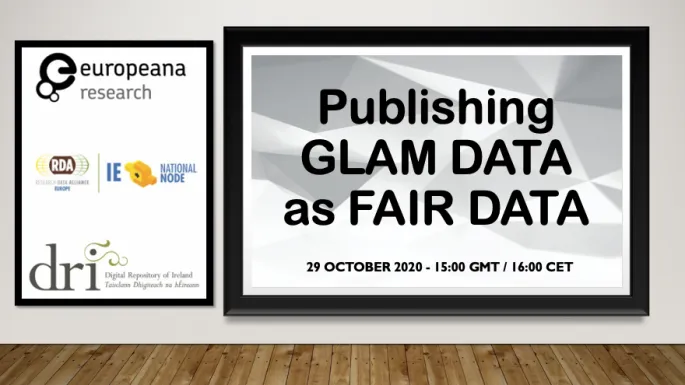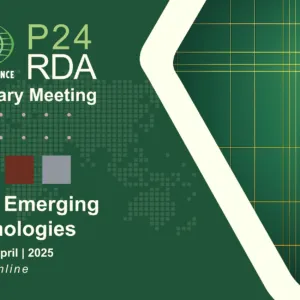The Digital Repository of Ireland (DRI) and the Research Data Alliance Ireland (RDA) national node, with the support of Europeana Research, invite you to attend the second session in our online series exploring the benefits of publishing GLAM data as FAIR data.
29 Oct 2020
15:00-16:30 GMT | 16:00-17:30 CET
Cultural heritage data collections from the Galleries, Libraries, Archives, and Museums (GLAM) sector are crucial resources that can help advance research for scholars in the humanities. However, data requires management and data management requires guidelines for implementation. The Findable, Accessible, Interoperable and Reusable (FAIR) principles have been widely adopted as best practice in data management and publication.
This collaborative webinar, organised by the Digital Repository of Ireland (DRI) and the Research Data Alliance Ireland (RDA) national node, with the support of Europeana Research, will explore the benefits of publishing GLAM data as FAIR data and will address questions about how this can be achieved.
The webinar will explore:
- What is FAIR and Open data?
- Why publish FAIR GLAM data?
- What does FAIR GLAM data look like?
- Where to publish FAIR GLAM data?
- How to clear copyright issues?
Speakers include:
- DRI Director, Dr Natalie Harrower: Dr Harrower is Director of the Digital Repository of Ireland, a certified national infrastructure for Ireland’s arts, social sciences and humanities data. Actively involved in developing the open science agenda in Ireland and internationally, Dr. Harrower is a member of the EOSC working group on FAIR and the European Commission’s FAIR data expert group (see Turning FAIR into Reality). With strong connections across the libraries, data and GLAM sectors, Dr Harrower serves on ALLEA’s Open Science Taskforce, and regularly contributes to publications and events that draw connections between Open Science and GLAM sector data, such as DARIAH’s booksprint How to Facilitate Cooperation between Humanities Researchers and Cultural Heritage Institutions and the early 2020 ALLEA report Sustainable and FAIR data sharing in the Humanities.
- Music Librarian at the Library of Trinity College Dublin, Roy Stanley: Roy’s responsibilities include promoting the library’s music research collections and encouraging their use by both scholars and performers. He curated the Long Room exhibition ‘In Tune: a millennium of music in Trinity College Library’ in 2013-14, which showcased the rich variety of source material held in TCD’s manuscript and print collections including a selection of manuscripts by Irish composer Ina Boyle (1889-1967). Roy’s talk will describe how untangling copyright issues was a crucial first step in facilitating open access to Boyle’s manuscripts via TCD’s Digital Collections platform, leading to scholarly research and the ongoing revelation of hitherto unperformed Irish music through concerts and recordings.
- Head of Research Services in Rijksmuseum, Saskia Scheltjens: Saskia Scheltjens is Head of Research Services at the Rijksmuseum, developing new tools and services for researchers on top of a rich open data collection. She is one of the founders of the Art Libraries Society of Flanders/Belgium and both publishes and lectures on the matter of art librarianship, library history and open (library) data in Belgium and abroad. Saskia is involved in international digital humanities research projects and the support of digital scholarship as well.
- Software Engineer at the Digital Repository of Ireland, Dr Kathryn Cassidy: Kathryn is a member of the technical team at the Digital Repository of Ireland based in the Research IT group in Trinity College Dublin. She leads the DRI’s Europeana activities and oversees the implementation of FAIR functionality in the Repository.
This session is the second in our online series dedicated to FAIR and open data for the GLAMs. If you missed the first event in the series, we invite you to watch the recording here.
Registration is free at the following link: https://us02web.zoom.us/webinar/register/WN_KUV90jpHQ0O18AiuIa6cGw
The event will take place on Zoom Webinar but it is not necessary to have a Zoom account to join. The event will be recorded but audience members will not be visible in the recording.







